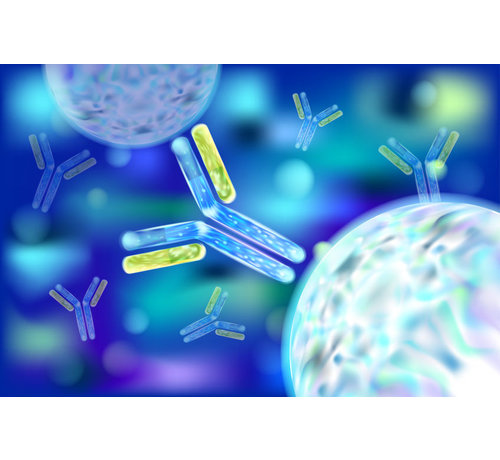Autoimmune gastritis anti-IF and parietal cells
This test consists of the following: antibodies to intrinsic factor + antibodies to parietal cells.
This test is also known by the names: Anti-IF, anti intrinsic factor, Antibodies to intrinsic factor.
This test is suitable to find out the cause of an inflamed stomach lining or to investigate if anemia is due to lack of vitamin B12.
Intrinsic factor is necessary for the absorption of vitamin B12 from food. When this does not work properly, harmful anemia can occur. This anemia called Pernicious Anemia is one of the most common causes of vitamin B12 deficiency and is often an autoimmune disease. The disease is characterized by chronic inflammation and thinning,shriveling of the gastric mucosa and reduction of and/or lack of parietal cells and intrinsic factor.
Antibodies to intrinsic factor lead to inflammation of the stomach wall, which disrupts the production of intrinsic factor and thus the absorption of vitamin B12. Because vitamin B12 is an important building block for the production of red blood cells, lack of vitamin B12 can lead to anemia. This specific form of anemia is called "penicillin anemia.
Normally, the immune system makes antibodies to fight off foreign invaders, such as bacteria or viruses. But sometimes things go wrong and antibodies are produced against a body's own compound, in this case intrinsic factor, which disrupts a body function and can cause disease. We speak of an autoimmune disease. Thus, the formation of autoantibodies can be seen as an error of the immune system.
A large group of patients do not have anemia or oversized red blood cells so the diagnosis should not depend on them.Pernicious Anemia is more common in combination with other autoimmune diseases, such as Hashimoto, Graves, Diabetes I, hypoparathyroidism, vitiligo, Myasthenis Gravis and Lambert Eaton syndrome.
In healthy people, no antibodies to intrinsic factor are present and the test is negative.
Absence of antibodies to intrinsic factor does not rule out pernicious anemia.
In 80% of patients with pernicious anemia, antibodies to intrinsic factor are present. The antibodies are highly specific to the disease.
A determination performed within the week following a vitamin B12 injection can be false positive.
The presence of high concentrations of free vitamin B12 can give false high results.
When finding a high vitamin B12 and a high IF value, both results can be unreliable. In healthy people, antibodies to intrinsic factor are not present.
The absence of antibodies to intrinsic factor does not rule out pernicious anemia.
In 80% of patients with pernicious anemia, antibodies to intrinsic factor occur and the result is positive. The antibodies are highly specific to the disease.
Antibodies to parietal cells
This test is used to aid in the diagnosis of autoimmune mastritis and pernicious anemia.
To find out the cause of a lowered vitamin B12 level.
Autoimmune gastritis is a condition in which the immune system attacks its own cells in the stomach. As a result, the mucous membrane on the inside of the stomach becomes permanently damaged. This can cause a pernicious anemia. Pernicious anemia is therefore not an isolated condition. It occurs only as a result of an autoimmune gastritis.
Pernicious anemia is a certain type of anemia that can occur as a result of autoimmune gastritis. This is a condition in which the mucous membrane in the stomach may be permanently damaged and certain vitamins cannot be absorbed.
In pernicious anemia, there is a vitamin B12 deficiency. This can eventually cause (permanent) symptoms. Autoimmune gastritis is also called type-A gastritis or chronic gastritis.
In addition to this test, the test for antibodies to intrinsic factor is also recommended to determine the cause of pernicious anemia.
Chronic or atrophic gastritis often produces few or only vague symptoms. Symptoms that may occur are:
- pain in the stomach area
- nausea
- bloating
- lack of appetite
- heartburn
- sometimes vomit
Long-term consequences
In chronic gastritis, the gastric mucosa can change permanently. One consequence is that the mucous membrane becomes thinner and thinner. This is called atrophic gastritis (atrophy is the shrinking or shriveling of tissue). Atrophic gastritis is usually the result of chronic type A gastritis (autoimmune gastritis).
A vitamin B12 deficiency caused by atrophic gastritis is also called pernicious anemia. In the long run, other symptoms may also occur. Recognizable by pernicious anemia are especially a painful tongue, fatigue, lightheadedness and pale vision. Because the body has large reserves of vitamin B12, it can take several years before a vitamin B12 deficiency develops. For early detection, the Holo TC test is the most suitable.
explanation of results AUTOANTILICHAMEN v Parietal cells
Unit of measurement is: U/ml
- If the result is less than 7, no parietal cells are found. Negative < 7.
- If the result is between 7 and 10, the result is questionable.
- If the result is positive, the result is not good. This is when the blood value is above 10.
Autoantibodies to Parietal cells occur in:
- pernicious anemia (90%)
- idiopathic chronic pancreatitis, inflammation of the pancreas (50%)
- hereditary blood (poverty) diseases (about 40%)
- atrophic gastritis type A (about 35%)
- Thyroid disorders (about 33%)




